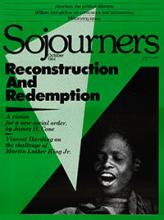Just as the central event in Israel's early story was the Exodus experience, the latter part of Israel's story is dominated by the experience of Babylonian exile. Exodus comes out of the experience of oppression and dispossession, but exile reflects the tragic results of Israel's attempts to manipulate the blessings and to overturn the covenant. In both Exodus and exile, God's grace has a further word to say, but it takes a different shape in the midst of the judgment of exile. It is to the shape of hope in the midst of judgment that we turn our attention in this article.
The path to exile is one in which the call to covenant obedience is constantly weakened or displaced by the temptations of the royal model, which we discussed earlier in the series (see "Like the Other Nations," Sojourners, August 1984). Idolatry and nationalized religion challenge and attempt to control the Yahweh-centered faith of covenant. Justice and righteousness are not served in the relations between neighbors. The gulf between wealthy and poor grows greater. Worship of the covenant God in the face of these realities becomes hypocrisy.
As we have seen, the classical prophets confronted Israel in these matters and championed the covenant way. The great prophet of the period leading up to the exile was Jeremiah. His preaching began in 626 B.C. and only ended after Jerusalem was destroyed in 587.
Read the Full Article

